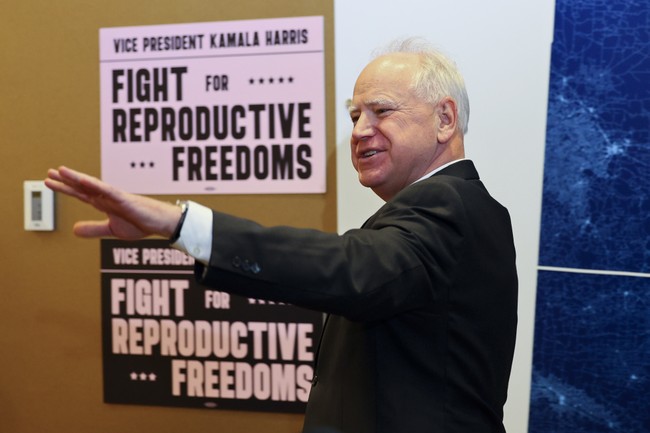
The entry of Minnesota Governor Tim Walz into the presidential race as Kamala Harris’s vice president marks the first time in 20 years that either party has a former enlisted man on the ballot. From what we’ve seen today, the Democrats will make a big deal about his service. In particular, they will harp on him being the “highest-ranking enlisted soldier ever to serve in Congress.” You can tell the email went out.
Excellent story/resume–highest enlisted soldier to serve in Congress, h.s. football coach, advisor to school’s first gay-straight alliance, teacher, member of congress from a Trump district, hell of an attack dog, great governor…the list goes on.
Now, let’s go win this thing! https://t.co/30PcMhSQgp
— Jim Messina (@Messina2012) August 6, 2024
Tim Walz is a:
– Veteran
– Former teacher
– State championship winning football coach
– Faculty advisor of the first gay-straight alliance at his school
– Gun owner
– Highest-ranking retired enlisted soldier ever to serve in CongressNot to mention has more charisma in his… https://t.co/6esaHLgd9G
— B.W. Carlin (@BaileyCarlin) August 6, 2024
Very cool fact about Tim Walz: he is the highest ranking enlisted soldier ever to serve in Congress.
— Alyssa Farah Griffin (@Alyssafarah) August 6, 2024
Fun fact: Tim Walz was the highest ranking soldier to ever serve in Congress pic.twitter.com/mqfjFlV9pd
— Republicans against Trump (@RpsAgainstTrump) August 6, 2024
Walz’s veteran status is supposed to give Kamala a connection to veterans. The “highest-ranking enlisted soldier” line is to give him the common touch.
While I don’t necessarily think military service qualifies anyone for anything — Frederick the Great is supposed to have said, “I had an ass that followed me on a dozen campaigns and at the end he was still an ass” — I do think that the character of service can tell us a great deal about the man.
Let’s look at JD Vance first. He was the product of a difficult childhood. He enlisted in the US Marine Corps in 2003 at age 18. He served four years as a journalist, including a deployment to Iraq. His motive for joining was that he believed, as did millions of us, that ridding Iraq of Saddam Hussein would make the world a better place.
Tim Walz was the son of a school administrator and stay-at-home mom. He had the advantages of a stable and somewhat privileged upbringing. According to Wikipedia,
With his father’s encouragement, Walz enlisted in the Army National Guard when he turned 17.[10][13] His father had served in the Korean War and paid for his education degree with the G.I. Bill,[13] and wanted his son to have the same opportunity.[13]
Walz served 24 years in the Army National Guard, retiring at the rank of master sergeant. Many posts on social media claim that he was a command sergeant major, the highest enlisted rank, but that is not true for all the reasons my colleague Matt Funicello spells out in UPDATED: MN Gov. Tim Walz Accused of Cowardice and Embellishment of Army Service Record by Former Peers. Oops. I guess that was a spoiler alert.
It is at the very beginning that their careers diverge.
Vance enlisted in the USMC, knowing that decision would land him in combat. Fates intervened, and he was not destined to become an 0311, a shooter on the pointy end of the spear. Not everyone is called to greatness. During his time in Iraq, he did accompany units when they went “outside the wire.” Vance’s former comrades still speak highly of him, even those who disagree with his politics.
Walz’s career was similar to that of many other young men in rural areas across the nation before the invasion of Iraq. Enlisting in the Guard was a tradition in some communities. The “one weekend a month and two weeks in the summer” training schedule was sold as a car payment by recruiters. Completing training made you eligible for VA benefits, including the zero-money-down home loan program. You drilled with friends and neighbors and made a lot of great business and professional contacts. Summer training was not necessarily high-pressure. One Guard battalion that I’m personally familiar with used weekend training to go deer hunting. None of this is to say some Guard units were not rock-solid. My division was partnered with 47th Infantry Division, the division to which Walz was assigned. I had men from that division attached to my company on several deployments. They were solid and capable and provided endless amusement on land navigation because their maps (Minnesota and North Dakota) had a 10-meter contour interval, and ours (California’s Coastal Range) had 50-meter contour intervals. Of course, the Iraq War upset that decades-old pattern and Guard units were regularly called up for combat deployments.
Walz’s moment of truth came when his unit was ordered to deploy to Iraq. As Matt Funicello details, Walz had his enlistment cut short by asking for an early retirement. In the process, he violated his pledge to complete a training course and was administratively reduced to one rank.
Where Vance was the ultimate volunteer, choosing a service he knew would result in deployment to Iraq, Walz approached his enlistment to get benefits and improve his chances for professional advancement. When Vance was ordered to Iraq, he went. When Walz, the senior noncommissioned officer in his battalion, was ordered to Iraq, he quit and left his men high and dry.
Sir,
Just when is it the role of the Noncommissioned Officer to abandon his unit as it gets ready to go into harm’s way? When is it the role of the NCO to fail to fulfill a service obligation?
COL(R) Michael A. Ford@Davidwebbshow https://t.co/ntkVTPQXHS
— Mike Ford (@MikeFor10394583) August 6, 2024
Don’t be misled. Not all veterans are the same, and not all military experience is equal.

